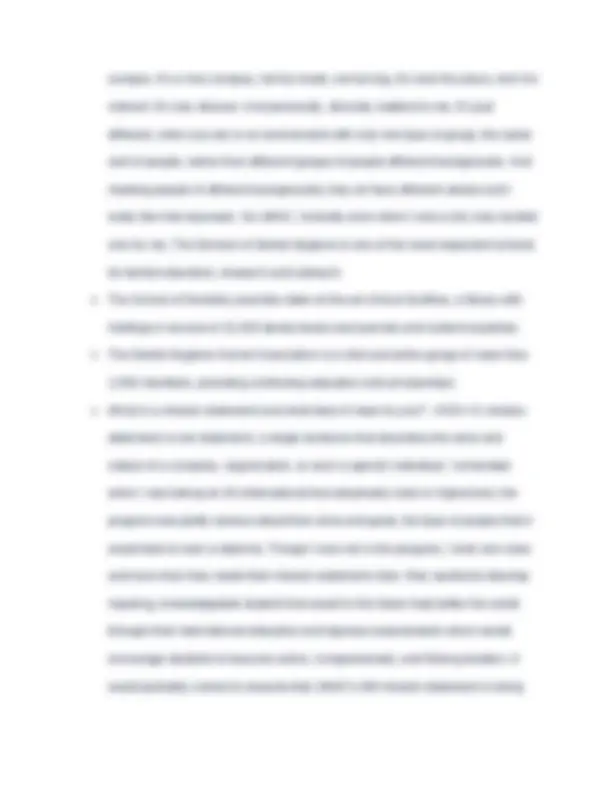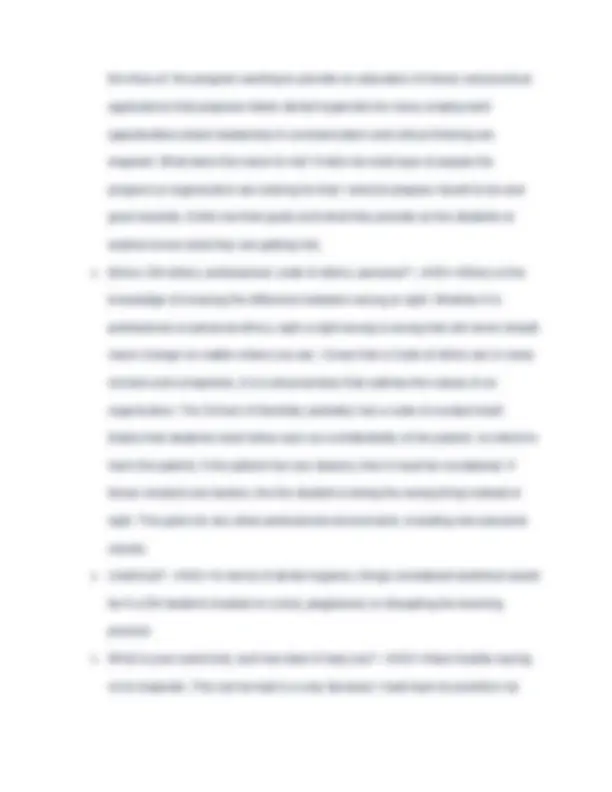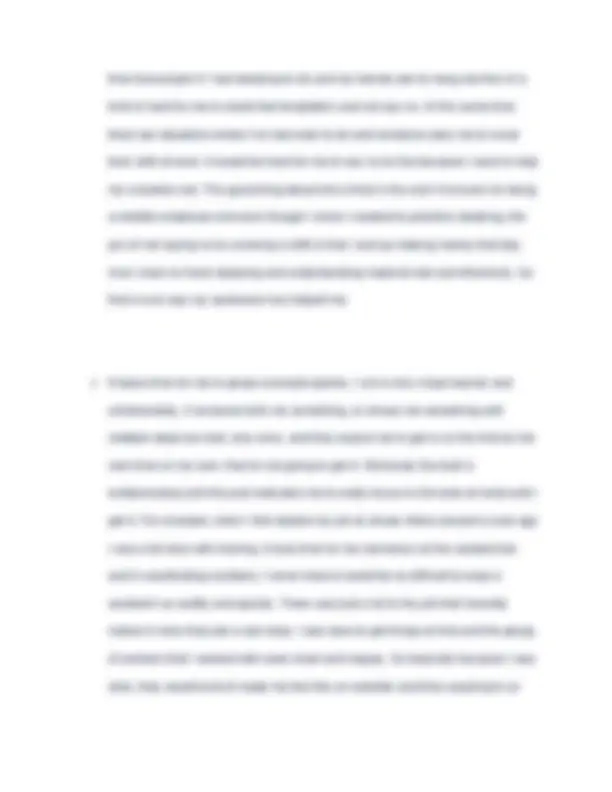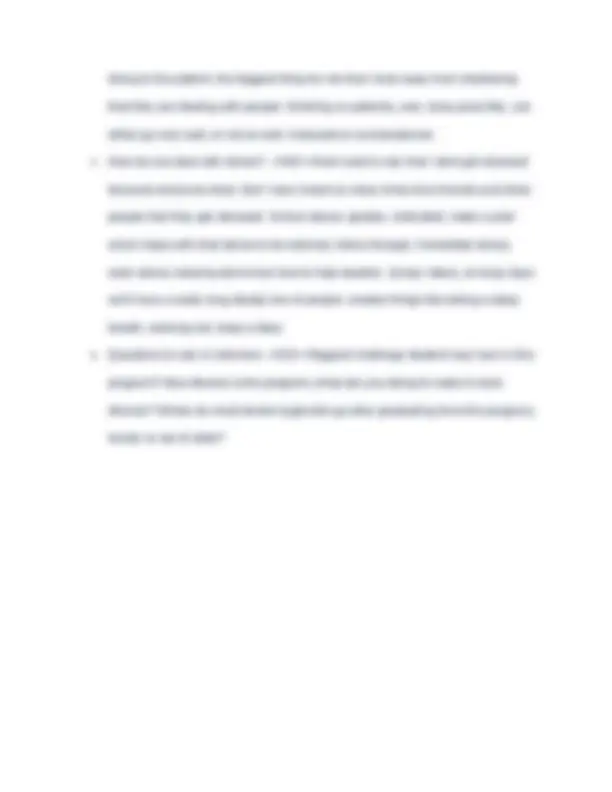






Study with the several resources on Docsity

Earn points by helping other students or get them with a premium plan


Prepare for your exams
Study with the several resources on Docsity

Earn points to download
Earn points by helping other students or get them with a premium plan
Community
Ask the community for help and clear up your study doubts
Discover the best universities in your country according to Docsity users
Free resources
Download our free guides on studying techniques, anxiety management strategies, and thesis advice from Docsity tutors
A transcript of an interview for the UMKC Dental Hygiene Program. The interviewee answers questions about ethics, competencies, teaching, motivation, and critical thinking. They also describe their interest in dental hygiene and why they chose UMKC. The interviewee talks about their experience as a tutor and a volunteer, and how it has changed their life. insights into the competencies required for ethical practice and management procedures in dental hygiene.
Typology: Exams
1 / 8

This page cannot be seen from the preview
Don't miss anything!





What does ethics mean to you? Describe a situation that would force you to consider ethics. - ANS>>The actual definition for ethics is a set of moral principals. Similar to that definition, I believe ethics is the knowledge of know what the difference is between wrong and right. I've worked as an Anatomy tutor at Longview. There have been times where the days were slow, I didn't have lunch, and it was very tempting to just drive out of campus and grab something to eat. But every single time this happened, I thought: no I shouldn't, I'm on the clock, I am getting paid, some one might come in and need my help. It would have been so easy to leave, no one watches me, I could have easily left for an hour and turn in my time sheets saying I worked those hours. Instead I stay and just work on homework and studying. This is just one small example that forced me to consider ethics What do the UMKC Dental Hygiene competencies mean to you? - ANS>>Competencies in general are the skills, knowledge, and values that contribute to a person's employee performance. For UMKC, competencies are the skills, knowledge, and values that an entry level graduate must consistently demonstrate to qualify for graduation. They will ask you if you want to teach - ANS>>Personally, teaching is not something I want to pursue right now in my life. But further down the road, I might
want to take classes to teach and share my knowledge especially if it is related to a corporate aspect and clinical practice. Why do you want to be a dental hygienist? - ANS>>The way I developed interest for dental hygiene is kind of interesting. When I was a kid, I never really like going to the dentist office, I did not care too much about my teeth. But growing up, my teeth was severely crooked to the point when if I smiled with my mouth closed, my smile was crooked. So I became very insecure about how I looked. I finally got braces and as the months went by my orthodontist working on my teeth, bit by bit I would see the changes and it would make me feel more confident about myself everyday. My orthodontist was super nice, the way she even just looked at my teeth, she barely had to touch my mouth, but at the end of the day, she did such an amazing job on my teeth I was completely inspired. And that's when I knew I wanted to pursue a field that had to with teeth. I went down from wanting to be an orthodontist, to dentist, to dental hygienist. But something about this job is what I can see myself doing in the near future. The time flexibility, the schedule, the environment, getting to meet new people hearing their stories, the salary. It just fits me and what I want the future. Why UMKC? - ANS>>I've never really been an out of state type of person. People are always talking about I can't wait to get out "misery." But not me. I like being close to home, friends, and family. And once I found out there was a program, and there are a few in the state, but this one is the best and it's close to home, I knew this is where I wanted to apply. Also, as a kid, UMKC being so close to the plaza, my parents have taken me here and we just walk around the
the lines of: the program wanting to provide an education of theory and practical applications that prepares future dental hygienists for many employment opportunities where leadership in communication and critical thinking are required. What does this mean to me? It tells me what type of people the program or organization are looking for that I need to prepare myself to be and grow towards, it tells me their goals and what they provide so the students or workers know what they are getting into. Ethics: DH ethics, professional, code of ethics, personal? - ANS>>Ethics is the knowledge of knowing the difference between wrong or right. Whether it is professional or personal ethics, right is right wrong is wrong that will never should never change no matter where you are. I know that a Code of ethics are in many schools and companies, it is a documentary that outlines the values of an organization. The School of Dentistry probably has a code of conduct itself. Duties that students must follow such as confidentiality of the patient, no intent to harm the patient, if the patient has any desires, then it must be considered. If these conducts are broken, the the student is doing the wrong thing instead of right. This goes for any other professional environment, including own personal morals. Unethical? - ANS>>In terms of dental hygiene, things considered unethical would be if a DH student cheated on a test, plagiarized, or disrupting the learning process What is your worst trait, and how does it help you? - ANS>>Have trouble saying no to requests. This can be bad in a way because I must learn to prioritize my
time forexample if I had studying to do and my friends ask to hang out then it is kind of hard for me to resist that temptation and not say no. At the same time there are situations where I've had work to do and someone asks me to cover their shift at work. It would be hard for me to say no to this because I want to help my coworker out. The good thing about this is that in the end I'm known for being a reliable employee and even though I know I needed to prioritize studying, the pro of not saying no to covering a shift is that I end up making money that day. Also I learn to finish studying and understanding material fast and effectively. So that is one way my weakness has helped me. It takes time for me to grasp concepts quickly. I am a very visual learner and unfortunately, if someone tells me something, or shows me something with multiple steps too fast, only once, and they expect me to get in on the first try the next time on my own- they're not going to get it. Obviously this trait is embarrassing and this just motivates me to really focus on the task at hand until I get it. For example, when I first started my job at Jersey Mikes around a year ago I was a bit slow with training. It took time for me memorize all the sandwiches and it coordinating numbers, I never knew it would be so difficult to wrap a sandwich so swiftly and quickly. There was just a lot to the job that honestly makes it more that just a sub shop. I was slow to get things at first and the group of workers that I worked with were small and cliquey. So basically because I was slow, they would kind of made me feel like an outsider and they would pick on
purchase at a store, is price worth quality, how long will it last, will I be using this item. or it can be as difficult as choosing a career path. How many classes to take, online vs. in class, time to work in that period. Work setting will have to use critical thinking. Example of tutoring. Same thing for volunteering: example UNICEF how many bags to put in each car How has volunteering changed your life? - ANS>>I like volunteering. I like helping people out, gives me something to do in the day, and I always end up learning something. Private islamic school: harvesters. In high school: Unicef- coldwater, NHS- picked up trash. Most reason: like meeting people and getting to know their stories. Coldwater- meeting people of different backgrounds when passing out food, they would tell their stories, and I like hearing them. Gave me perspective on how different their life is than mine. I like being around people in general. Being competent in DH - ANS>>To be a competent DH: competence for ethical practice- in practical training and in the classroom, being able to assess people of different ages and backgrounds, the health and safety provisions, management procedures (communication) Plan B - ANS>>Dont really like to think of plan B, just want everything to go smoothly. Plan B, sign up again next year, UMKC number one choice, apply to other schools. In between that time, I will shadow more or try to get an internship somewhere. Take classes- biology, dental terminology, web designing What have you learned from shadowing? - ANS>>From the couple times I've shadowed, Other than looking at the tools used and observing what the DH is
doing to the patient, the biggest thing for me that I took away from shadowing that they are dealing with people. Working on patients, very close proximity, can either go very well, or not so well. Awkward or conversational. How do you deal with stress? - ANS>>Dont want to say that I dont get stressed because everyone does. But I have heard so many times from friends and other people that they get stressed. School stress- grades, motivated, make a plan which helps with that stress to be relieved, follow through. Immediate stress, work stress, tutoring dont know how to help student. Jersey mikes, on busy days we'll have a really long steady line of people. smaller things like taking a deep breath, working out, keep a diary. Questions to ask in interview - ANS>>Biggest challenge student may face in this program? How diverse is the program, what are you doing to make it more diverse? Where do most dental hygienists go after graduating from this program, locally or out of state?